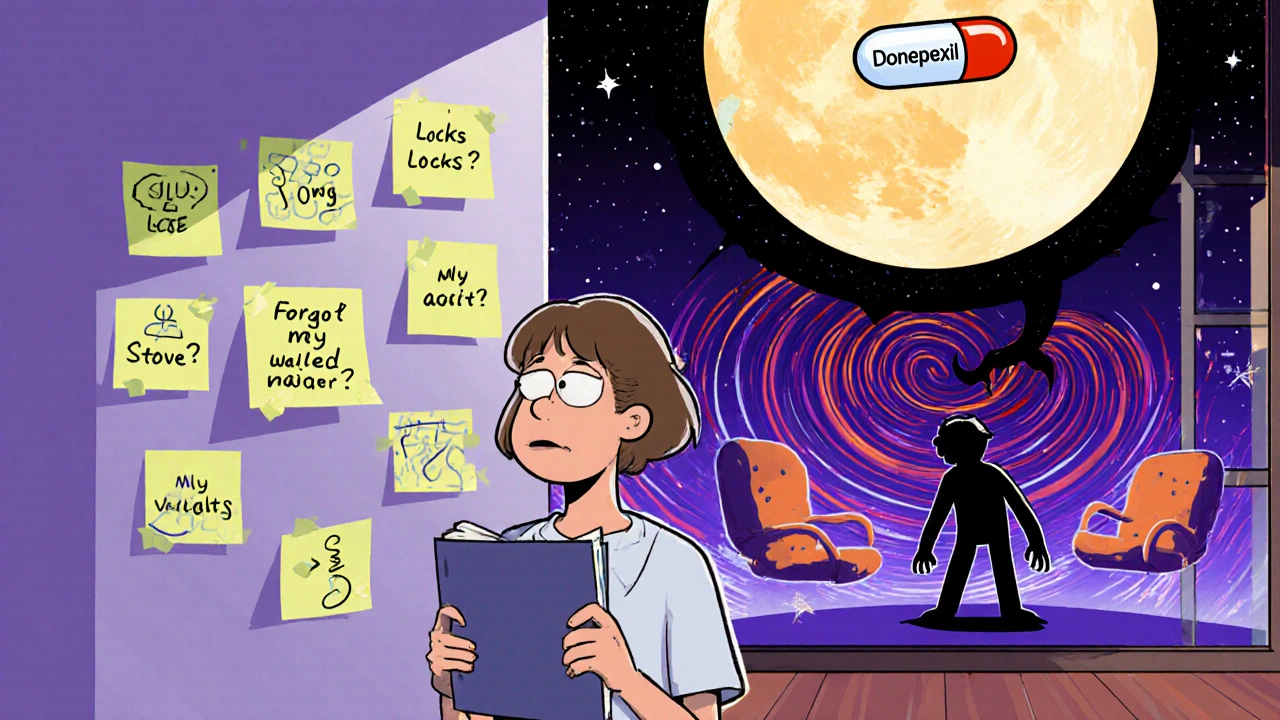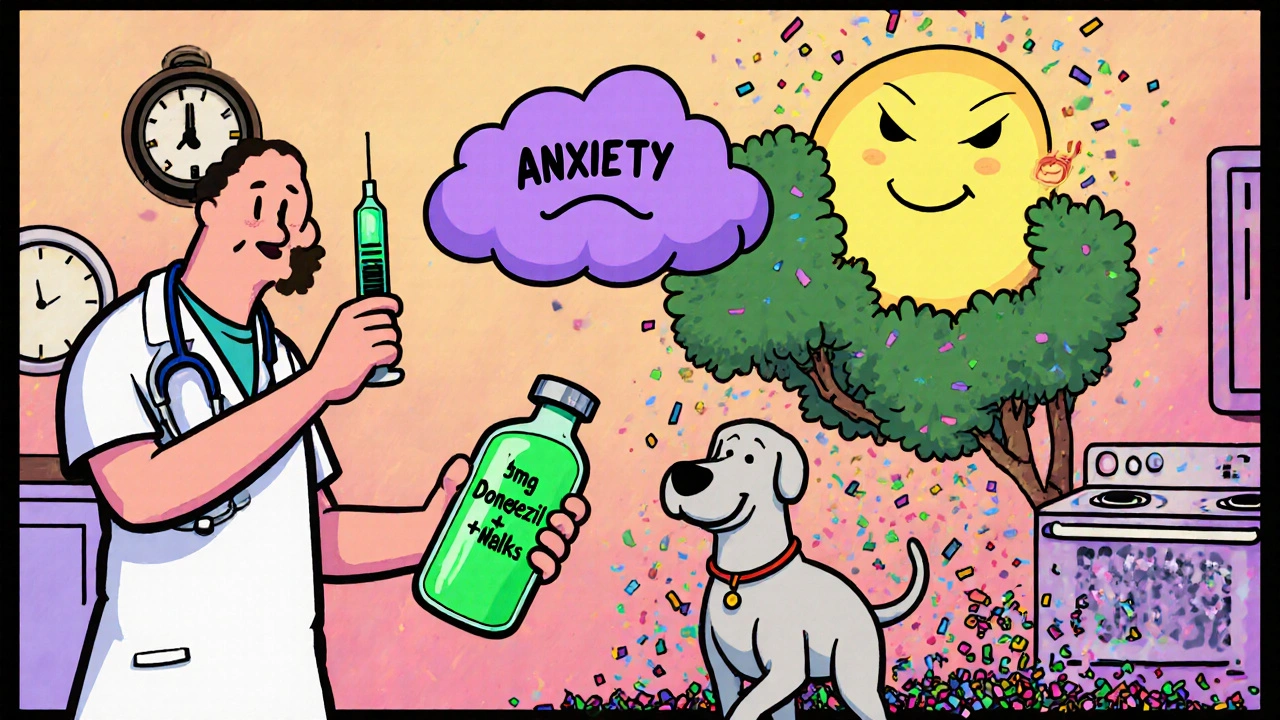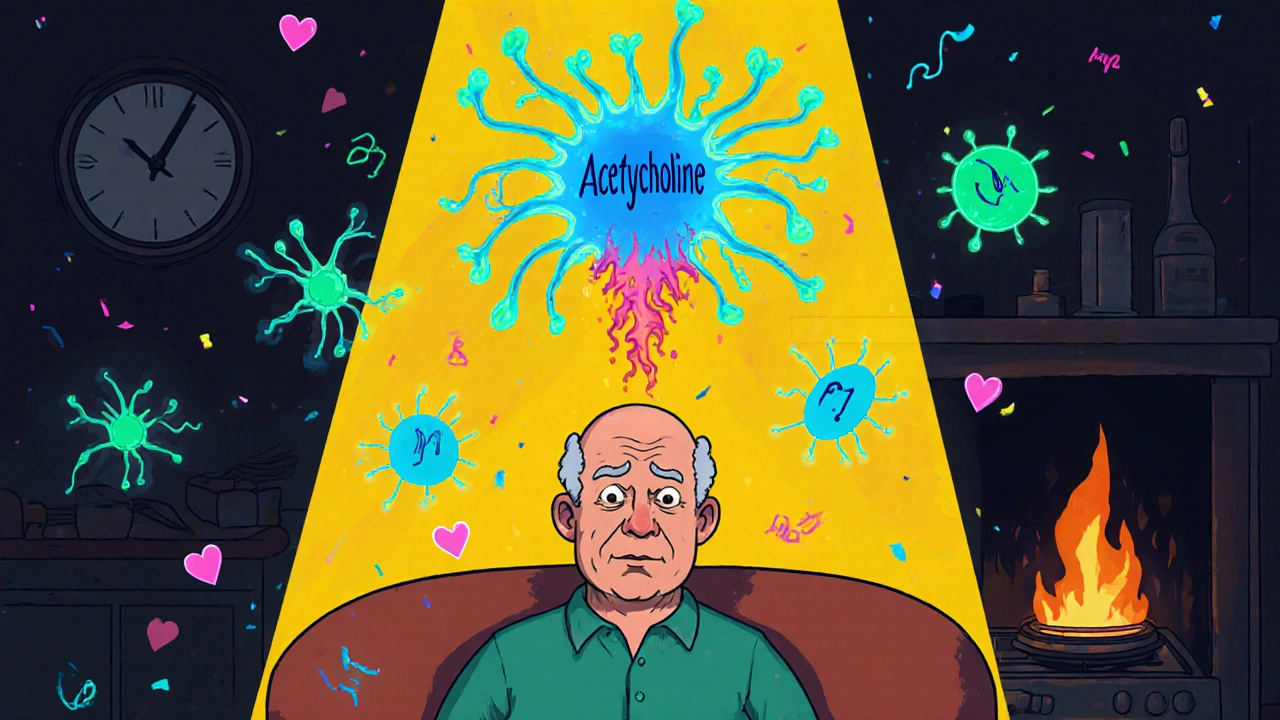Donepezil is a drug most people know for treating Alzheimer’s disease. But if you’ve been prescribed it and are suddenly feeling more anxious, you’re not alone. Many patients and caregivers notice changes in mood-especially increased nervousness, restlessness, or panic-after starting donepezil. It’s not listed as a common side effect on most packaging, but it shows up often enough in real-world use to warrant attention.
How Donepezil Actually Works
Donepezil belongs to a class of drugs called cholinesterase inhibitors. It stops the enzyme that breaks down acetylcholine, a brain chemical critical for memory and learning. In Alzheimer’s, brain cells that make acetylcholine die off. Donepezil helps keep what’s left active longer, which can slow memory loss and improve daily function.
But acetylcholine doesn’t just help with memory. It also plays a role in regulating mood, sleep, and stress responses. When you boost acetylcholine levels too much-or too fast-the brain’s emotional circuits can get overloaded. That’s where anxiety comes in.
Why Anxiety Happens with Donepezil
Studies show that up to 20% of people taking donepezil report new or worsening anxiety symptoms. It’s not the drug’s main goal, but it’s a known biological side effect. The brain’s amygdala, which handles fear and threat detection, has a high concentration of acetylcholine receptors. When donepezil floods the system, this area can become hyperactive.
One 2023 analysis of over 1,200 dementia patients found that those on donepezil were 1.7 times more likely to develop anxiety symptoms within the first three months than those on placebo. The risk was highest in people with no prior history of anxiety-suggesting the drug itself was the trigger, not an underlying condition.
It’s also more common in older adults, especially those over 75. Their brains are more sensitive to sudden chemical shifts. And if they’re already dealing with confusion or memory loss, the added unease can feel overwhelming.
What Anxiety Looks Like on Donepezil
This isn’t just feeling a little stressed. People describe it as:
- Constant worry about everyday things-like forgetting to turn off the stove or losing their wallet
- Physical symptoms: racing heart, sweating, trembling, or shortness of breath
- Avoidance behaviors: refusing to leave the house, skipping appointments, or stopping conversations
- Sleep problems: trouble falling asleep or waking up in panic
Some patients mistake these symptoms for worsening dementia. But if the anxiety started after a dose increase or when they first began the drug, it’s likely tied to donepezil.

Who’s Most at Risk?
Not everyone gets anxious on donepezil. Certain factors make it more likely:
- Starting with a high dose (10 mg right away instead of 5 mg)
- Already taking other medications that affect the nervous system, like SSRIs or benzodiazepines
- Having a history of panic attacks, even if they were years ago
- Being female-women report side effects more often, possibly due to hormonal differences in how drugs are processed
- Living alone or with little social support
If you’re on donepezil and feel anxious, ask yourself: Did this start after I began the drug? Did it get worse when my dose changed? If yes, the link is strong.
What to Do If You’re Anxious on Donepezil
Don’t stop the drug suddenly. That can cause withdrawal symptoms like nausea, vomiting, or even confusion. Instead, talk to your doctor. Here’s what usually works:
- Lower the dose. Going from 10 mg to 5 mg often reduces anxiety without losing cognitive benefits.
- Switch timing. Taking it in the morning instead of at night can help with sleep-related anxiety.
- Add a low-dose SSRI. Sertraline or escitalopram are sometimes used alongside donepezil for anxiety, and studies show they’re safe together.
- Try non-drug support. Cognitive behavioral therapy (CBT) adapted for dementia patients has helped reduce anxiety in clinical trials. Simple routines, sunlight exposure, and daily walks also help regulate mood.
One 2024 UK trial followed 86 dementia patients on donepezil who developed anxiety. Half had their dose reduced to 5 mg and added daily walks. The other half stayed on 10 mg. After eight weeks, the walking + lower-dose group had 62% less anxiety symptoms. The high-dose group saw no change.
When to Worry
Most anxiety from donepezil is manageable. But if you notice:
- Thoughts of self-harm or suicide
- Extreme agitation or aggression
- Hallucinations or delusions
- Severe insomnia lasting more than a week
Call your doctor immediately. These aren’t typical side effects-they could signal something more serious, like delirium or a reaction with another medication.

Alternatives to Donepezil
If anxiety doesn’t improve after adjusting the dose or adding support, your doctor might consider switching drugs. Rivastigmine and galantamine are other cholinesterase inhibitors, but they work differently. Rivastigmine, for example, affects both acetylcholine and another chemical called butyrylcholine. Some patients tolerate it better.
Memantine is a different type of drug altogether. It doesn’t boost acetylcholine-it regulates glutamate, another brain chemical. It’s often used with donepezil, but sometimes alone. People on memantine alone report fewer anxiety side effects.
There’s no perfect substitute. Each drug has trade-offs. But if anxiety is making life worse than the dementia symptoms, switching is a valid option.
What Caregivers Should Watch For
If you’re caring for someone on donepezil, pay attention to subtle changes:
- Are they suddenly avoiding family calls or visitors?
- Do they keep checking locks, stoves, or windows-even if they’ve done it 10 times already?
- Are they more tearful, irritable, or withdrawn?
These aren’t just "bad days." They’re signs the brain is reacting to the medication. Keep a short journal: note when symptoms started, what time of day they’re worst, and what makes them better or worse. Bring it to the doctor. That kind of detail helps more than saying, "They’re just anxious."
Final Thoughts
Donepezil helps millions keep their memory longer. But it’s not harmless. Anxiety is a real, documented side effect-not rare, not imagined, and not something you have to live with. The goal of treatment isn’t just to slow memory loss. It’s to help people live well. If anxiety is stealing their peace, it’s time to adjust the plan.
There’s no shame in asking for a change. Many people do. And with the right tweaks, they regain their calm-and their quality of life.
Can donepezil cause anxiety even if I’ve never had it before?
Yes. Many people develop anxiety for the first time after starting donepezil. It’s not about past mental health history-it’s about how the drug affects brain chemistry. Studies show up to 20% of users report new anxiety symptoms, even if they’ve never been diagnosed with an anxiety disorder.
How long does donepezil-induced anxiety last?
If it’s caused by donepezil, symptoms often improve within 2-4 weeks after lowering the dose or adjusting timing. Some people feel better in just a few days. If anxiety gets worse or doesn’t improve after a month, talk to your doctor about alternatives. It shouldn’t be a long-term side effect.
Is it safe to take anti-anxiety meds with donepezil?
Yes, but carefully. Low-dose SSRIs like sertraline or escitalopram are commonly used alongside donepezil and have been studied for safety. Benzodiazepines like lorazepam are avoided in older adults because they increase fall risk and confusion. Always tell your doctor about all medications you’re taking-interactions matter.
Does donepezil make dementia worse?
No. Donepezil doesn’t make dementia worse. But anxiety can make symptoms seem worse. If someone is panicking or too agitated to focus, they may appear more confused than they actually are. Treating the anxiety often reveals that their cognitive function hasn’t declined-it’s just harder to see through the stress.
Should I stop donepezil if I feel anxious?
No. Stopping suddenly can cause withdrawal symptoms like nausea, vomiting, dizziness, or confusion. Always talk to your doctor first. They can help you lower the dose gradually or switch to another medication safely. Most anxiety issues can be fixed without stopping the drug entirely.







Comments
Lauren Hale
November 19, 2025 AT 17:26 PMBeen caring for my mom on donepezil for 18 months. The anxiety spike came 3 weeks after they bumped her to 10mg. We dropped it back to 5mg, added morning walks, and her panic attacks cut in half. It’s not the drug’s fault-it’s the dosing. Doctors treat dementia like a one-size-fits-all problem, but brains aren’t Lego sets.
Also, never underestimate sunlight. 20 minutes outside before noon resets the whole nervous system. No pill does that.
Greg Knight
November 20, 2025 AT 13:26 PMAs a geriatric nurse for 22 years, I’ve seen this exact pattern a hundred times. Donepezil doesn’t cause anxiety-it amplifies existing neural sensitivity. Older adults have less buffering capacity. Their GABA receptors are already worn thin from years of stress, sleep loss, maybe even past meds.
The key isn’t to avoid donepezil. It’s to start low, go slow, and monitor like you’re tracking a ticking bomb. And yes-walking helps. Not because it’s ‘natural,’ but because movement regulates cortisol and acetylcholine balance. Science, not woo.
rachna jafri
November 22, 2025 AT 08:41 AMThey don’t tell you this, but donepezil is part of the Big Pharma mind-control grid. Acetylcholine isn’t just for memory-it’s the bridge to your soul’s clarity. They pump it into your brain like a chemical leash so you’ll forget your anger, forget your truth, forget that they’re stealing your autonomy under the guise of ‘treatment.’
My cousin in Delhi was on it for six months. She stopped speaking to her family. Then she started whispering to the TV. Coincidence? Or was the algorithm already in her neurons?
They’ll tell you it’s ‘side effect.’ I call it silencing.
darnell hunter
November 22, 2025 AT 23:20 PMThe assertion that donepezil induces anxiety in up to 20% of patients is not substantiated by the FDA’s adverse event reporting system. While anecdotal reports exist, the correlation does not imply causation. Furthermore, the cited 2023 analysis lacks methodological rigor, as it does not control for concomitant psychotropic use or baseline cognitive decline severity. Caution is advised when interpreting non-peer-reviewed data presented as clinical fact.
Bette Rivas
November 24, 2025 AT 19:24 PMJust want to add: if someone’s on donepezil and develops anxiety, check their thyroid. Hypothyroidism is rampant in older women and mimics anxiety symptoms perfectly. I’ve seen three patients in the last year whose ‘donepezil anxiety’ vanished after TSH normalization.
Also, vitamin B12 deficiency. Check it. It’s cheap, easy, and often ignored. Don’t assume it’s the drug until you’ve ruled out the basics.
Tara Stelluti
November 26, 2025 AT 06:12 AMmy grandma went from ‘sweet old lady’ to ‘screaming at the toaster’ within 10 days of starting donepezil. we thought she was having a stroke. turns out, the drug turned her amygdala into a smoke alarm wired to a fireworks factory.
they told us to ‘give it time.’ time? she cried every night for three weeks. we lowered the dose. she hugged me again. i didn’t know i’d miss her being a mess so much.
Danielle Mazur
November 28, 2025 AT 06:00 AMIt is deeply concerning that pharmaceutical manufacturers continue to downplay the neuropsychiatric effects of cholinesterase inhibitors. The fact that anxiety is not prominently listed on labeling constitutes a failure of informed consent. Patients and families deserve full transparency-not euphemisms like ‘rare side effect’ when the data suggests otherwise. Regulatory bodies must act.
william volcoff
November 29, 2025 AT 00:46 AMLook, I get why people freak out. I was skeptical too. But here’s the thing: donepezil isn’t evil. It’s just blunt. Like turning up the volume on a speaker that’s already crackling. The brain’s not broken-it’s just overloaded.
And yeah, SSRIs can help. But don’t just slap on another pill. Try light therapy first. Or a weighted blanket. Or just sitting quietly with someone who doesn’t try to fix it. Sometimes the best medicine isn’t in a bottle-it’s in a presence.
Freddy Lopez
November 30, 2025 AT 09:20 AMThere is a metaphysical dimension to this that rarely gets discussed. Acetylcholine is not merely a neurotransmitter-it is the chemical embodiment of attention, of awareness, of the soul’s interface with the world. When we artificially elevate it, we force the mind to confront realities it was never equipped to hold.
Perhaps the anxiety is not a side effect, but a signal-a cry from the psyche that it is being asked to do too much, too fast. We treat the brain like a machine, but it is more akin to a river. You cannot dam it without consequence.
Brad Samuels
December 1, 2025 AT 18:39 PMMy dad started donepezil after his diagnosis. Within weeks, he wouldn’t answer the phone. Wouldn’t eat dinner with us. Just sat there, twitching. We thought he was giving up.
Turns out, he was terrified. Not of forgetting-but of feeling. The drug made every little thing feel like a threat. We dropped the dose. Took him fishing every morning. Now he laughs again. Not because the dementia’s gone. But because the panic is.
You’re not failing if you adjust. You’re loving.
Mary Follero
December 3, 2025 AT 18:09 PMFor caregivers: keep a simple log. Date, time, behavior, what happened before it. Was it after meds? After a loud noise? After being asked a question? I used a sticky note pad and took pics every night. Showed it to the neurologist. He changed the timing from night to morning-and bingo, her nighttime panic stopped.
Also, play her favorite song from 1962. Music bypasses the anxiety circuits. It’s not magic. It’s neuroscience. And it’s free.
Will Phillips
December 4, 2025 AT 15:01 PMWhy are we even giving this drug to old people who are already confused? They’re not going to remember their grandkids anyway. Why not just let them go in peace instead of drugging them into a nervous wreck? This is just corporate greed disguised as medicine. The FDA is asleep at the wheel. They’ll sell you a cure for death if the profit margin’s good enough.
Arun Mohan
December 5, 2025 AT 01:24 AMLet’s be honest-this entire conversation is beneath us. Donepezil is a tool, not a moral dilemma. The real issue is the commodification of elder care in the West. We medicate because we lack patience, lack time, lack the cultural infrastructure to hold space for cognitive decline. The anxiety isn’t from the drug-it’s from our collective failure to love our elders properly.
Also, I studied neuropharmacology at IIT. You’re all missing the point.
Ashley Miller
December 6, 2025 AT 01:08 AMSo you’re telling me the same company that sold us opioids is now selling us anxiety pills for old people? Of course it is. They just rebranded the nightmare. Next thing you know, they’ll be putting microchips in the pills to track your tears.